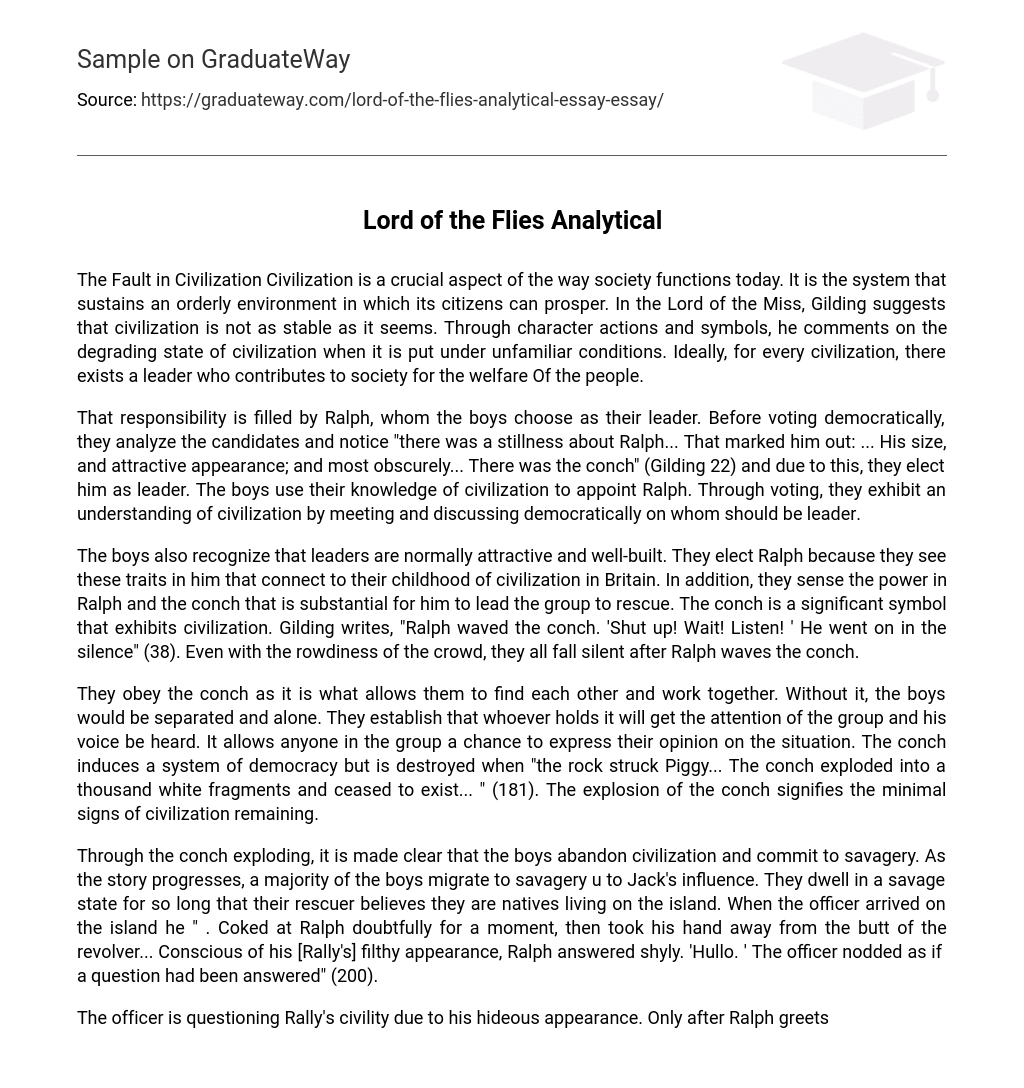The Fault in Civilization Civilization is a crucial aspect of the way society functions today. It is the system that sustains an orderly environment in which its citizens can prosper. In the Lord of the Miss, Gilding suggests that civilization is not as stable as it seems. Through character actions and symbols, he comments on the degrading state of civilization when it is put under unfamiliar conditions. Ideally, for every civilization, there exists a leader who contributes to society for the welfare Of the people.
That responsibility is filled by Ralph, whom the boys choose as their leader. Before voting democratically, they analyze the candidates and notice “there was a stillness about Ralph… That marked him out: … His size, and attractive appearance; and most obscurely… There was the conch” (Gilding 22) and due to this, they elect him as leader. The boys use their knowledge of civilization to appoint Ralph. Through voting, they exhibit an understanding of civilization by meeting and discussing democratically on whom should be leader.
The boys also recognize that leaders are normally attractive and well-built. They elect Ralph because they see these traits in him that connect to their childhood of civilization in Britain. In addition, they sense the power in Ralph and the conch that is substantial for him to lead the group to rescue. The conch is a significant symbol that exhibits civilization. Gilding writes, “Ralph waved the conch. ‘Shut up! Wait! Listen! ‘ He went on in the silence” (38). Even with the rowdiness of the crowd, they all fall silent after Ralph waves the conch.
They obey the conch as it is what allows them to find each other and work together. Without it, the boys would be separated and alone. They establish that whoever holds it will get the attention of the group and his voice be heard. It allows anyone in the group a chance to express their opinion on the situation. The conch induces a system of democracy but is destroyed when “the rock struck Piggy… The conch exploded into a thousand white fragments and ceased to exist… ” (181). The explosion of the conch signifies the minimal signs of civilization remaining.
Through the conch exploding, it is made clear that the boys abandon civilization and commit to savagery. As the story progresses, a majority of the boys migrate to savagery u to Jack’s influence. They dwell in a savage state for so long that their rescuer believes they are natives living on the island. When the officer arrived on the island he ” . Coked at Ralph doubtfully for a moment, then took his hand away from the butt of the revolver… Conscious of his [Rally’s] filthy appearance, Ralph answered shyly. ‘Hullo. ‘ The officer nodded as if a question had been answered” (200).
The officer is questioning Rally’s civility due to his hideous appearance. Only after Ralph greets the officer in English, does he realize that the boy is civilized. Through common language of a civilized amount the officer is able to recognize Rally’s civility. The situation has drastically changed from the democracy before. The boys are no longer recognizable as humane but as annalistic savages. By the end of the novel, Gilding establishes Jack as an instigator of savagery. However in the beginning of the novel, Jack is unable to commit an uncivilized action of killing a pig.
Gilding explains, “They knew very well why he hadn’t: because of the enormity of the knife descending and cutting into living flesh; because of the unbearable blood” (31 This demonstrates that Jack is still tied to civilization. He is unable to stab the pig because his civilized state of mind informs him that killing an animal in such a manner is immoral. However, as the boys become tired with the regularity of eating fruits, the prospect of hunting becomes a necessity. Hunting evolves into a chance to demonstrate power over the rest of the group.
Jack is led to believe that his inability to stab the pig is a weakness to his conquest for power, which in turn motivates him to kill his first pig. This milestone causes Jack to crave the hunt and leads him to exhibit cruel behavior. This cruelty ultimately leads to the development Of vagary within him and his opposition to civilization. He splits from Rally’s civilized band to form a savage tribe where he hunts and kills just for the thrill of it. When Jack and his tribe hunt down Ralph, he “viciously, with full intention… Ruled his spear at Ralph” (181). Jack fully intends to kill Ralph without a slight hesitation. The thrill of the hunt controls Jars thought, which causes him to act on impulse. His intention to kill Ralph is equivalent to slaying pigs. Jack no longer recognizes the difference between killing a human and hunting an animal. As his time on the island passes, his civility diminishes. Through the experiences and symbols of the boys’ endeavor on the island, Gilding expresses that he supports the concept of civilization.





